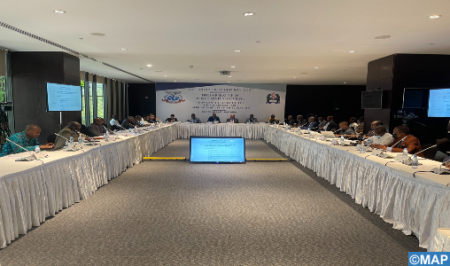Tanzania: African Seminar Calls for Expulsion of ‘Sadr’ from AU
A large panel of African Members of Parliament, former Ministers of Foreign Affairs and ambassadors, business leaders, experts and academics as well as civil society and think tank representatives called, on Saturday in Dar Es Salaam, for the expulsion of the ghostly “Sadr” from the African Union (AU). The expulsion of “sadr”, an Algerian-backed armed group “with no attributes of a sovereign state”, will correct a “burdensome historical error” inherited from the Organization of African Unity (OAU), and which discredits the AU in its Constitutive Act stipulating that the Union must only bring together sovereign states, said the participants in a seminar themed “The Imperative of Post-Covid Recovery: How Can the Resolution of the Sahara Issue Spur African Stability and Integration?”. Participants in this event, co-organized by the Institute of Peace and Conflict Studies (IPCS) and the Tanzania Peace Foundation (TPF), were unanimous in stressing that the resolution of the Moroccan Sahara issue necessarily requires the expulsion of this puppet entity, a “source of division and instability” in Africa. “The presence of the +sadr+ within the AU is a serious violation of international law and the Charter of the pan-African organization,” said Fahmi Said Ibahim, former Comorian Minister of Foreign Affairs, explaining that this entity has none of the legal elements of a state, namely territory, population and a power to exercise. The African Union should correct this “historical error” that affects the credibility and neutrality of the Union and is an obstacle to the resolution of the Moroccan Sahara issue, said Ibrahim, adding that the Moroccan autonomy plan for the Sahara represents the “only realistic and definitive solution” to this longstanding dispute. For Amine Laghidi, diplomacy expert and the only Moroccan participant in this seminar, the presence of the so-called “sadr” in the AU opposes in fact Morocco to a non-state entity that maintains and displays its warmongering, without being able, however, to make any concrete contribution to the organization. Recalling that this “non-state” and “non-sovereign” entity had been admitted to the OAU at a time when the continent was in the grip of different ideological currents, Laghidi noted that its continued membership in the AU is a “clear violation” of the Constitutive Act of the pan-African organization. Orlando Simba, executive director of the Pan-African Congress in Kenya, said that two-thirds of AU members do not recognize “Sadr”, calling on African states to put an end to divisions within the pan-African organization and work together to strengthen the Union and the continent’s integration through the expulsion of this entity. Agreeing in the same sense, the editor of the South African media group “The Star”, Sifiso Gift Mahlango, noted that this conflict is the result of Algeria’s “toxic” policies, which has been supporting and arming this ghostly entity for decades, considering this conflict a “major obstacle” to the march of Africa towards integration, peace, stability and progress. For his part, the Executive Director of the Institute of Peace and Conflict Studies (IPCS) Cosma Bahali, stressed the imperative of initiating an intellectual reflection to find pragmatic solutions, based on the Moroccan autonomy plan, already described by the UN and the majority of African countries as “credible” and “serious”. For Andre Gakwaya, Director General of the Rwandan Information Agency (ARI), the presence of “Sadr” within the AU goes in “absolute contradiction” with the position of the UN, which calls on the parties to reach a just, final and mutually acceptable political solution to this regional dispute.

